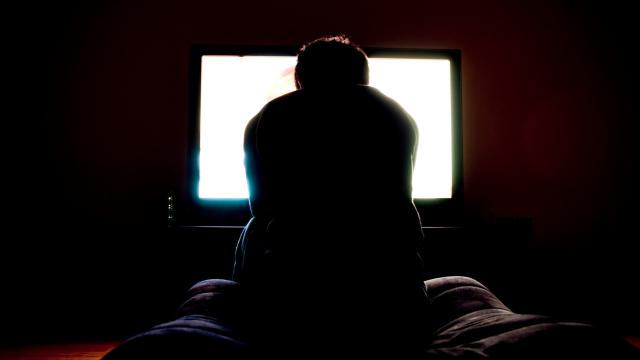Some kinds of sitting around are worse for your heart than others, at least according to a new study out today. The findings suggest that watching more hours of TV a day can raise your risk of eventual heart disease and early death. At the same time, more sitting at work might not have any apparent negative effect on your heart health.
It’s plainly obvious that excessive sedentary behaviour is bad for us. But there are still questions about the specifics of this harm. That includes not only figuring out whether some types of sedentary behaviour are worse, but whether different populations might be affected differently by too much sitting.
Most human studies on sedentary behaviour, and really, most studies in general, have only looked at white people of European descent. This disparity is even more egregious given that African Americans are more likely to develop and die from heart disease.
“African Americans have a 30 per cent greater risk of dying from heart disease compared to whites,” lead author Keith Diaz, an exercise physiologist and assistant professor of behavioural medicine at Columbia University Medical Center, told Gizmodo in an email. “So the goal of our study was to determine if TV watching or workplace sitting are possible behaviours that should be targeted for lowering their risk of heart disease.”
For their study, published Wednesday in the Journal of American Heart Association, Diaz and his team looked exclusively at African Americans. They analysed data from the Jackson Heart Study, a long-running observational study of more than 5000 middle-aged residents living in or near Jackson, Missouri. The project, which started in 2000, is thought to be the largest study of its kind in the U.S., looking at the factors that affect the cardiovascular health of African Americans.
They looked at over 3500 volunteers who reported how much time they typically spent watching TV as well as how much they sat while working. Then they tracked their health over an average follow-up period of about 8 years, watching for cases of cardiovascular disease and death.
Like you’d assume, people who watched four hours or more of TV a day had a greater chance of heart problems and death than those who watched two hours or less – about a 50 per cent greater relative risk, after adjusting for known factors like age or sex. The absolute added risk was still small, though. Around 7.5 per cent of people in the low TV-watching group had heart disease or died by the study’s end, compared to just under 13 per cent in the high TV-watching group.
But there wasn’t any similar relationship spotted when it came to work. Those who said they almost always sat at work weren’t any more or less likely to get a heart attack or die than those who said they rarely sat.
This isn’t the first research to find a lack of health harms tied to occupational sitting. And though these studies can only indirectly offer evidence for their conclusions, the team has a few theories for why occupational sitting doesn’t wear our hearts down the same way that staying glued to a screen does.
“At work, we stand up from our desk pretty regularly to walk to a printer, copier, or co-workers desk. Some research suggests that these small bouts of activity, we like to call them activity snacks, may be enough to reduce the harms caused by sitting,” Diaz said. “In comparison, when watching TV we often watch for long periods at a time without moving.”
How we watch TV might also play a role, since many people will eat snacks during a show or eat a big dinner right before settling in for a Netflix binge. “The combination of eating a large meal and then not moving for hours may be toxic for the body,” Diaz added.
These factors are likely to be especially important for African Americans, because they’re thought to watch more TV on average. At the same time, as many other studies have, this research found that exercise was seemingly able to cancel out the effects of sedentary behaviour—those who watched lots of TV but still got 150 minutes or more of moderate-to-vigorous exercise a week had no higher chance of heart disease or dying than everyone else.
There are undoubtedly lots of outside influences that make it harder for people to have the time and resources to exercise that much, like living in poorer neighbourhoods that lack gyms or parks. But there are still small things most people should be able to do to become more heart healthy, according to Diaz.
“Instead of eating dinner and then sitting down to watch TV for the rest of the evening; go for a walk around your neighbourhood and then watch some TV. We are not saying to stop watching TV altogether. The key here is moderation,” he said.
Another implication of the study is that even people who spend long hours sitting at work, like truck drivers, office workers, or pug-obsessed reporters, aren’t necessarily doomed to one day come down with heart issues. “Focusing on reducing sitting time outside of work hours and replacing it with physical activity will still provide them with important health benefits,” Diaz added.
